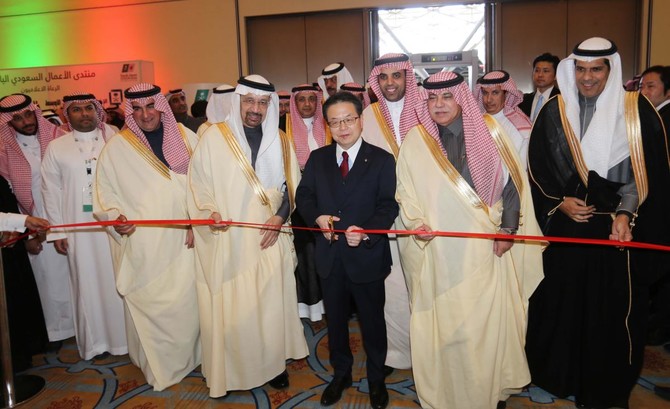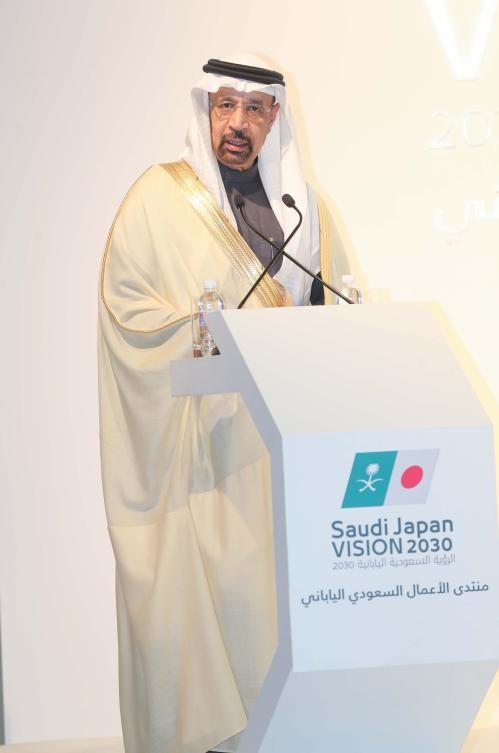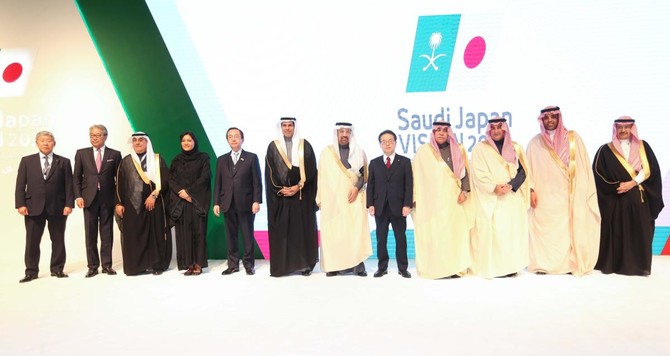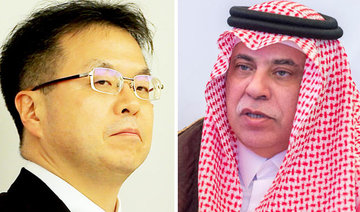RIYADH: Japanese businesses reaped the rewards of investment as Minister of Commerce and Investment Majid Al-Qasabi on Sunday called on them to benefit from the ongoing economic reforms in Saudi Arabia under Vision 2030.
Al-Qasabi was speaking at the opening session of the Saudi-Japanese Business Forum held under the banner of “Saudi-Japan Vision 2030” with a focus on bolstering the Saudi-Japan partnership and taking the bilateral cooperation on a steady path of progress.
The major highlight of the day-long forum was Japanese companies winning investment licenses from the Saudi Arabian General Investment Authority (SAGIA), which organized the bilateral forum, and the signing of six Memorandums of Understanding (MoU) involving the government and private-sector entities from the two countries.
At the end of the opening session the new investment licenses were granted to three Japanese companies: The SMBC company working in the field of financial and administrative consultations, the SB Energy company in the field of renewable energy consultancy, and the TADANO for providing scientific and technical services for Saudi agents in the field of industry.
The MoUs signed by the companies from two sides include Saline Water Conversion Corporation and New Energy and Industrial Technology Development Organization, Japan’s largest public management organization, General Sport Authority, Fujifilm and Mediva, the health care consulting and medical service operation company, General Commission of Audiovisual Media and the Japan Cooperation Center for the Middle East, Saudi Stock Exchange and Nomura International, a Japanese financial holding company, Al-Yemani Group and Matsutani Chemical Industry, and Saudi Electricity Company and Tokyo Electric Power Company and Nissan Motors.
Earlier, Al-Qasabi stressed that the Kingdom is considered the most suitable environment for the Japanese business sector. The Kingdom provides all potentials and opportunities for expansion in the markets of the Middle East and Africa in a manner that will allow investors achieve the highest profit rates with minimum risks in a suitable environment and advanced infrastructure, he added.
He also underscored that the Saudi and Japanese parties will jointly explore what has been achieved in the joint Saudi-Japanese Vision 2030 and aim to remove obstacles encountering businessmen in both countries.
He called on the Japanese side to follow the latest reforms on the investment environment in the Kingdom.
Joining him in the opening session, Minister of Energy, Industry and Mineral Resources Khalid Al-Falih said the meeting comes at a time when the two countries have a responsible role in the international community toward issues of peace and global economy and their continued pursuit to revive the economy and enrich the globe with unique experience in construction, industry, technology, and research.
Highlighting the significance of bilateral partnership in the energy sector, Al-Falih said the Kingdom’s reliability in the production of energy had enabled the country to meet 35 percent to 40 percent of Japan’s energy requirements over the years.
“Our partnership with Japan’s refining, marketing and chemicals sectors through Shua Shell Refinery has been continuing for a decade and a half, and Okinawa crude oil storage has helped boost Japan’s oil reserves,” he said.
Further underlining the Kingdom’s plan to raise its production by about 10,000 megawatts by 2023, or about 10 percent of the country’s total energy production, the minister said that there were great opportunities for cooperation in this field as well.
“The techniques of storing carbon and hydrogen are witnessing a tangible development,” he said, stressing the importance of boosting bilateral cooperation on peaceful use of nuclear energy in the Kingdom. He further said the history of the two countries is full of success and achievements.
Al-Falih expressed happiness overseeing the progress of partnership of Saudi Aramco and Sumitomo Chemical in Petro Rabigh Project.
He also praised the role of the Japanese banks in funding activities in the Kingdom, notably the government borrowing activities.
Japanese Minister of Economy, Trade and Industry Hiroshige Seko, leading his country’s delegation, said that Japan is at the top of cultures to contribute to the Vision 2030 partnership.
He said that we have full engagements by our companies with 37 B2B MoUs, there are 67 Japanese firms engaged in the Riyadh mission, and that 10,000-plus Saudi engineers and staff are being trained through public-private vocational training.
SAGIA Gov. Ibrahim Al-Omar underlined that the aim of Saudi Vision 2030 was to create promising opportunities for investment and development and its economic objectives include increasing the contribution of foreign investments to 5.7 of the GDP by 2030, as well as raising the contribution of the private sector to 65 percent of the GDP from the current 40 percent.
He said the volume of bilateral trade in the past year amounted to more than SR100 billion, while the number of Japanese companies to invest in the Kingdom, until the end of last year, was 96 with the total investment exceeding SR53 billion.
Tarek bin Abdul Hadi Al-Qahtani, President of the Saudi-Japanese Business Council, said that the volume of development witnessed by the trade and investment movement between the two countries during the
past two decades reflected the strength of the strategic relationship and partnership between them.
“The Kingdom is also one of the attractive countries for investments and has viability for Japanese investment that is expected to rise significantly as part of the implementation of the Saudi-Japanese Joint Vision 2030,” he noted.
Al-Qahtani also highlighted the implementation of initiatives for knowledge exchange, youth projects in both countries, the establishment of a Saudi-Japanese bank, as well as acceleration of the establishment of a Saudi-Japanese company to boost investment in various fields.
The forum was attended by a trade delegation of 60 Japanese companies, led by the Japanese Minister, Nabil Al Amoudi, Minister of Transport, and Princess Reema bint Bandar, President of the Saudi Federation for Community Sports.
The Japanese delegation included Executive Vice President of the Japanese Foreign Trade Organization Yasukazu Aerino and the representative of the Japan Cooperation Center for the Middle East, C. J. Hirota.
An exhibition under the title “Invest in Saudi Arabia” was also organized on the sidelines of the event.
The forum included four panel discussions on the recent achievement of Tayseer – a SAGIA initiative that aims to secure and stimulate the investment environment for the private sector and to provide the necessary guarantees for the preservation of rights, and also showcased projects funded by the Public Investment Fund including Qidiya, an iconic entertainment destination for Riyadh residents.
Saudi Finance Minister Mohammed Al-Jadaan also announced the signing of a MoU with Mitsubishi UFJ Financial Group (MUFG), Japan’s largest financial group, to promote the development of Saudi youth’s skills in the financial sector as part of the Ministry’s Advanced National Talent Development Program.
Japanese reap rewards as three firms win operational license at business forum in Riyadh
Japanese reap rewards as three firms win operational license at business forum in Riyadh

- Saudi and Japanese parties aim to remove obstacles encountering businessmen in both countries
- Total Japanese investments in KSA as of end 2017 exceeded SR53 billion
Saudi Arabia targets 50 wildlife breeding programs within 5 years

- Strategy follows surging interest in protecting prized native species
RIYADH: Saudi Arabia’s top wildlife protection body has launched a plan to operate 50 breeding programs by 2030 and improve environmental balance, its CEO has said.
Mohammed Ali Qurban, head of the National Center for Wildlife, said the number of programs has already surged from seven to 21 in recent years, amid renewed interest in the protection of valued native species.
The breeding programs are based on precise scientific principles, starting with the selection of suitable species at research centers, followed by veterinary care and specialized nutrition programs, he added.
At the final stage, protected species are rehabilitated for release and monitored using the latest tracking and data analysis technologies.
The relocation of more than 10,000 animals in Saudi Arabia is “an important step in restoring ecosystems and enhancing environmental balance in the Kingdom,” Qurban said.

“Releasing wildlife into the wild contributes to forming new populations capable of self-reproduction; these releases support the genetic diversity of wild populations and enhance their ability to resist disease and adapt to environmental changes,” he added.
Releases have so far included more than 80 priority species, most notably reem antelopes, Arabian oryx, idmi gazelles, mountain ibex, houbara bustards, ostriches and sandgrouses. The animals were released within their historical and ecological ranges.
Qurban said that the plans take into account the carrying capacity of natural habitats and the importance of safe ecological corridors that connect protected areas to facilitate species movement and population sustainability.
Release sites are spread across more than 60 diverse environmental locations, including natural reserves, royal reserves and national parks, as well as strategic sites within the Kingdom’s giga-projects, ensuring the dispersal of animals across their targeted geographical ranges.
The efforts are part of a national integrated framework to support the goals of the Saudi Green Initiative, Vision 2030 and the National Environment Strategy, aiming to achieve thriving and sustainable wildlife and ecosystems, Qurban said.


















